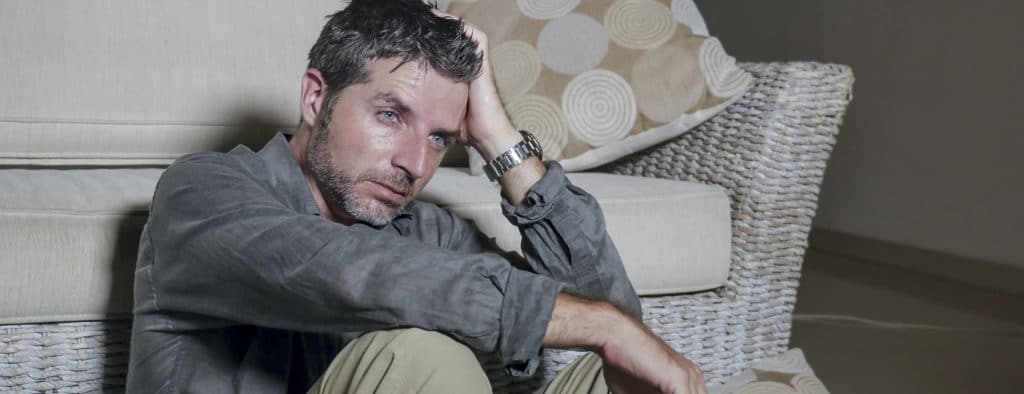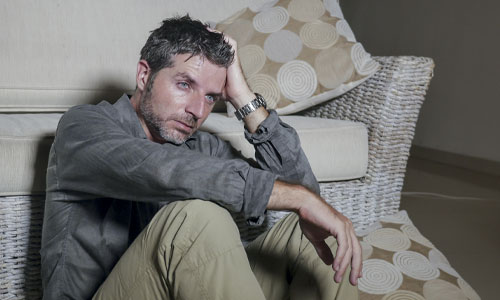
Depression isn’t a universal condition. It comes in many different variants, and there are actually ten types of depression which are commonly offered as a diagnosis. Two of the most prevalent of these are situational and clinical depression. They’re similar to one another in the way they present but have very different causes, and so each requires a specific approach in terms of treatment.
Situational Depression
Situational depression is relatively shorted lived and usually comes about through a traumatic event or unexpected life change. In some literature, it’s also known as “adjustment disorder with depressed mood.” This form of depression is something that can affect us all at some point in our lifetime. And around 6.7% of the population experience this form of mental illness every year. Meaning, you likely know at least or perhaps a handful of people who’ve dealt with the condition.
Causes of Situational Depression
The fact that situational depression arises isn’t because of the life changes that we face. It’s the result of our inability to properly deal with them. If you’re already in a vulnerable state and continue to encounter tough situations, it can lead to an eventual breakdown. But it doesn’t always come about through a string of events. Oftentimes, all it takes is a single trigger to create an emotional downturn. The most common of these is bereavement. Everyone deals with grief in their own way. And for some, it can be a challenging process of letting go and moving on.
Here are some other common triggers:
- Divorce
- Loss of employment
- A serious/debilitating accident
- Moving away from friends and family
- Bereavement
Other factors that put you at risk of situational depression include:
- Pre-existing mental health conditions
- Past childhood trauma and stress
- A family history of depression
Symptoms
Symptoms will vary from individual to individual, and you won’t necessarily display every single one. But here are some of the most common:
- Apathy and a lack of motivation
- Feelings of hopelessness and never-ending sadness
- Insomnia
- Anxiety and Stress
- Inability to concentrate
- Withdrawing from social circles
- Suicidal thoughts
Self-Management
Unlike most other forms of the condition, situational depression responds well to self-care practices and allowing yourself the time to heal naturally. Making positive lifestyle choices can be a huge help in allowing you to enjoy a better quality of life while you address your challenges. You could explore any of the following to help ease yourself through the process of readjusting to your new circumstances:
- Eating a well-balanced cleaner diet
- Creating a regular routine for yourself
- Getting out to exercise regularly
- Taking part in an online or community support groups
- Immersing your in a current hobby (or starting a new one)
- Talking to family and friends
Clinical Depression
If situational depression exists at the end of the more manageable spectrum than clinical depression lies on the opposite side. When your symptoms have reached the level to where they are chronic and debilitating, this is known as clinical depression. It’s at this point that professional help needs to be sought to help you on your way back to recovery. Clinical depression can refer to one of several forms of depression that require treatment. So clinical depression isn’t necessarily a diagnosis in and of itself, but instead, is more of an umbrella term to describe several conditions. However, the most common of these is major depressive disorder or unipolar depression.
Symptoms
Again, as with situational depression, how these symptoms will manifest isn’t specific to the individual in question. You may experience more or less with existing on a sliding scale in terms of severity.
Major Depression
When people think of the textbook version of depression, this is the archetypal set of symptoms that comes to mind. To receive a diagnosis of major depression, you need to have experienced the majority of these every day for at least two weeks:
- Feeling empty and constant sadness
- Apathy towards activities you used to love (Work and hobbies etc.)
- Drastic changes in appetite as well as weight loss or gain
- Feeling temperamental and easily agitated
- Feeling heavy, lethargic and a lack of motivation
- Physical symptoms such as aches, stomach pains and headaches
- Feeling unworthy or guilty about receiving help
- Being indecisive and inability to rationalise
- Recurrent thoughts about suicide
Other Types of Clinical Depression
It’s important to be aware of what other conditions are considered as clinical depression, so you can make an informed choice about whether or not you need treatment. Here are some of the most common that you may also encounter:
Psychotic Depression: Psychotic depression is considered to be on the most severe end of the depressive spectrum. It’s usually characterised by hallucinations and other delusions related to life stressors.
Bipolar: Clinical depression can also form a part of the depressive phase of bipolar, which alternates between phases of extreme elation and a more depressed state. In this depressive state, symptoms can be very similar to those observed in major depression.
Postpartum Depression: This form of depression is also known as the baby blues. It occurs after giving birth and is very treatable. However, it does need to be identified in order to avoid a worsening of the condition.
Treatment
There are many avenues you can explore to help alleviate the severity of your depression ranging from medication to psychotherapy and alternative therapies. Although medication is often seen as the least desirable from a health perspective, it can often provide the most effective relief in the short-term. Despite the fact they do take a while to take effect in the system, they can provide enough stability to improve quality of life. This can then allow you to explore more integrative avenues such as psychotherapy, most notably Cognitive Behavioural Therapy (CBT). This form of psychotherapy helps you identify the root cause of your issues and address in a proactive manner. It’s this type of approach that will ultimately see you make positive and long-lasting changes in your life.












